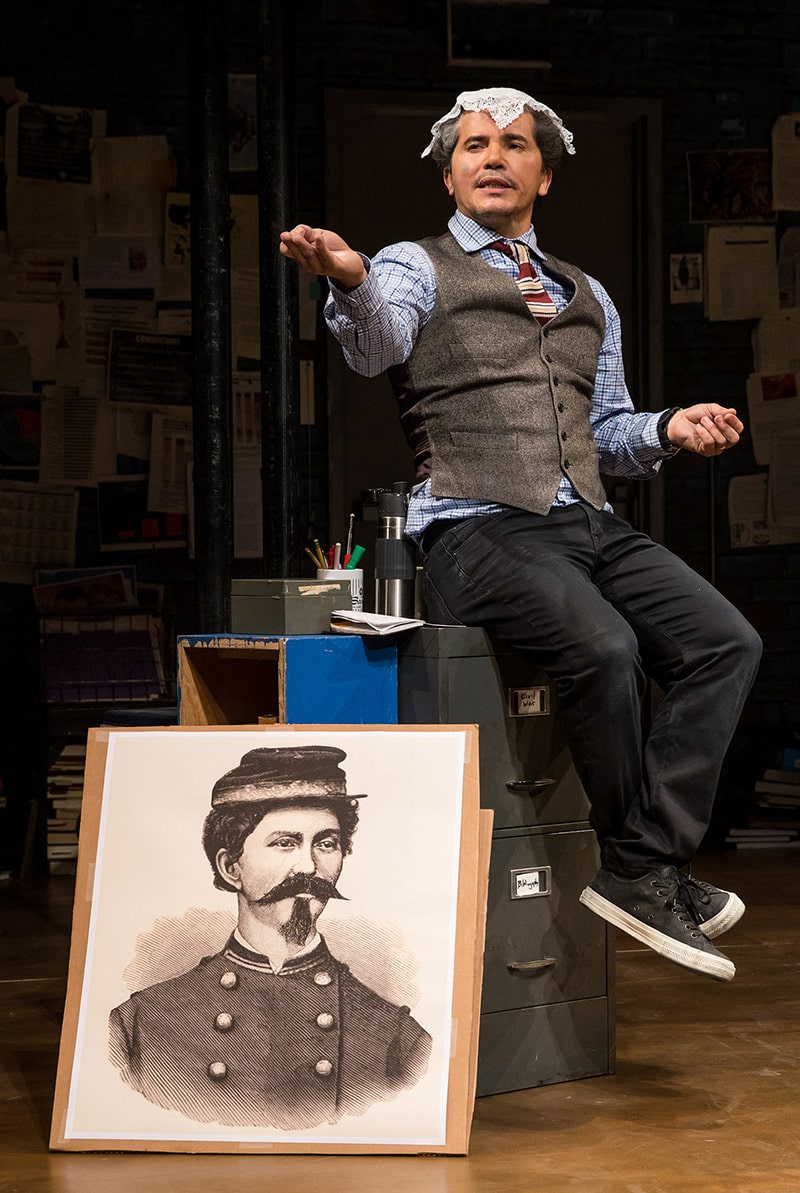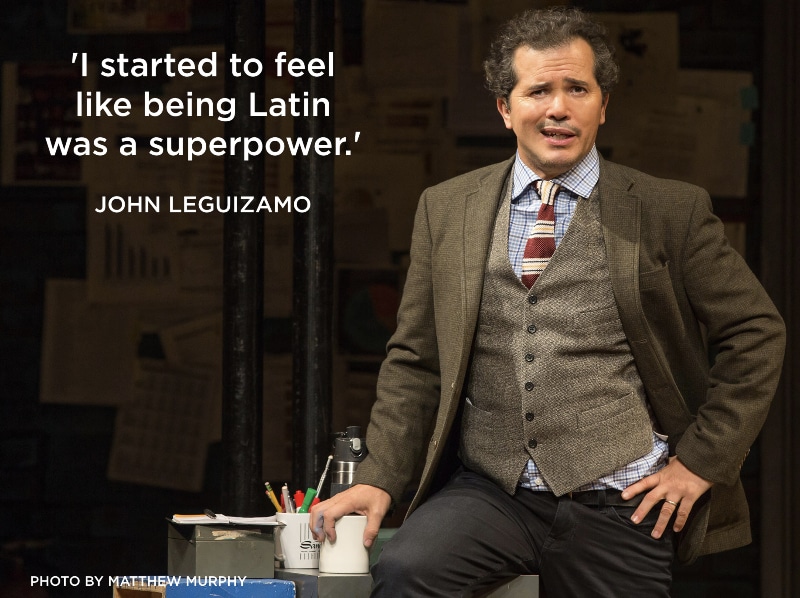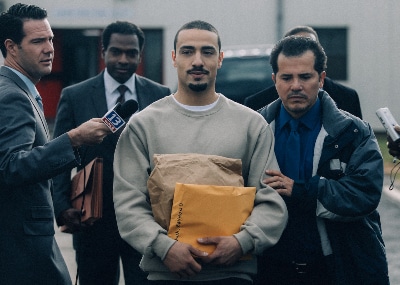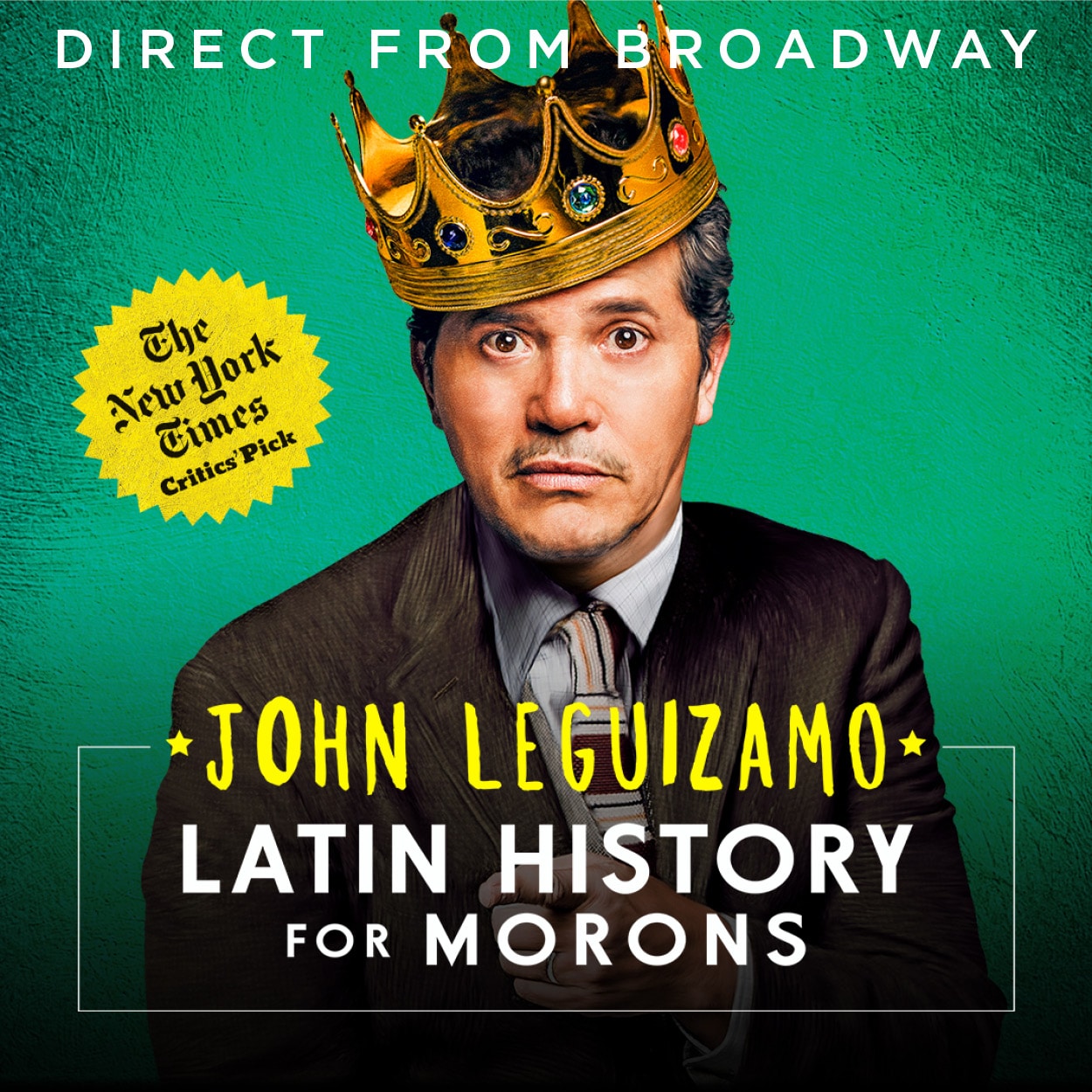DCPA NEWS CENTER
Enjoy the best stories and perspectives from the theatre world today.
Enjoy the best stories and perspectives from the theatre world today.
Actor John Leguizamo grew up in New York City a Colombian immigrant with very few pop-culture role models who looked like him: Ricky Ricardo in “I Love Lucy.” Speedy Gonzales. Freddie Prinze. “They were far and few between,” he said.

John Leguizamo in ‘Latin History for Morons.’ Photo by Matthew Murphy.
“Then we had West Side Story, but I feel conflicted about that,” he added of the iconic gang musical that follows rumbling white and Puerto Rican gangs spinning and snapping and stabbing their way through the Upper West Side of Manhattan.
“West Side Story was the only Latin representation we had in popular movies back then, but it was all based on very negative information,” he said. “And on the news, you saw yourself constantly portrayed very negatively. Our positive stories were never celebrated.”
It was not until Leguizamo became a grown man that his research led him to great Latin writers such as Gabriel García Márquez, Roberto Bolaño, Isabel Allende, Pablo Neruda and others dating back to the 1800s. And that got him wondering what else he wasn’t taught in school about the contributions of Latin leaders, artists and soldiers throughout history.
Leguizamo, an amorphous human encyclopedia who absorbs facts as easily as breathing, has since made himself an expert on the subject, and that has led to his latest one-man theatrical production. Latin History for Morons is not only playing in Denver, it was largely developed right here back in 2017.
‘Denver people are the ones who helped me make this show, and now I’m grateful that I can bring it back to them all polished and retooled.‘ – John Leguizamo
“Comedy Works was great for me because they gave me the opportunity to really workshop this show,” he said. “I went there for four nights doing two shows a night.”
But it wasn’t standup comedy.
“No, I just read to these poor people from my notes,” he said. “People in comedy clubs are not used to being read to. And it was a 2½ hour show. I think they were drunk out of their minds, because they just kept pouring the alcohol, and it was the longest show they’ve ever had.”
But that was part of the genesis of a show that went on to Broadway and won a special 2018 Tony Award.
“Denver people are the ones who helped me make this show,” he said, “and now I’m grateful that I can bring it back to them all polished and retooled.”
Leguizamo was motivated to develop Latin History for Morons for his son, who was being bullied and racially profiled in his middle school not far from where Leguizamo was raised.
Leguizamo also had grown up feeling othered and second-class, and he was done with that.
“I was like, wait a minute. How is this possible with all these contributions from Latin people?” he said. “I wanted to give my son facts and information about Latin heroes to empower him.”
But Leguizamo was the one who was changed. Or, as he put it: “Un-moronized.”
“I was empowered. I was transformed,” he said. “It was like a domino effect. The information I found started to double and triple and quadruple. I couldn’t believe the incredible amount of Latin contributions to America and the world I found.
“I started to feel like being Latin was a superpower.”

Now Leguizamo is bringing his comic, kinetic, dizzying stage energy into a Denver classroom known as The Buell Theatre. And if he hadn’t already settled on such a provocative title, Leguizamo might have called his production Latin History for all Americans.
“If we had a syllabus for this course, it would say that this is not the victor’s version of American history,” he said. “History should include all of the people who helped create America. It should include all of the Black, Latin and Native American contributions to the French and Indian War, the Revolutionary War, the Civil War, the War of 1812. We were there.
“That would be a great book, and then these Latinx kids in school would see themselves reflected back and they would feel different about themselves. They would feel like they could project themselves into the future in a successful way. When you don’t see yourself included in all this information, you feel that you have no future. When you constantly don’t see yourself in positive or heroic roles, how do you ever reimagine yourself?”
Leguizamo was intrigued to learn that the DCPA Theatre Company will soon be presenting the world premiere of a play called twenty50 that imagines that by the year 2050, the white power structure in this country will absorb Latinx people into its population, in effect preserving a white majority.
“That show sounds fascinating,” he said, “because when you look back at World War I, they didn’t separate Latin people from white people. They counted light-skinned Latin people and medium-skin-toned Latin people as white people. So now we’re going back to including Latin people as white people but the thing is: Why can’t we all just be Americans?”
Here is more from John Moore’s conversation with John Leguizamo:

John Leguizamo, right, was nominated for an Emmy Award for his work in ‘When They See Us.’
John Moore: Congratulations on your recent Emmy Award nomination for your work in “When They See Us.” What compelled you to take on the role of caring but flawed father of one of the now Central Park Exonerated Five?
John Leguizamo: Don’t tell anyone, but I would have paid to be on that project. I just thought it was one of those important pieces of art that changes things. That book made big changes in America. To me, playing this particular dad and helping people understand what it’s like to be a single, underprivileged Latino dad who is working five jobs, and always afraid of losing those jobs. And then when your child is profiled and wrongfully accused, what do you do? How do you fight the system when the system is against you? It shows that vulnerability of what happens to Latinx kids in America when they’re wrongfully profiled. It’s almost impossible to clear them. Parents don’t know their legal recourses. They don’t know their rights, and these poor kids get lost in the system – the paid-for, privatized prison system.
John Moore: Did you sleep when you were doing all this research?
John Leguizamo: I’m really good at absorbing facts, I always have been. I have ADHD, and I think maybe something about that gives you a certain space in your head for extra information. Anyway, I’m really good at retaining facts. Obviously a lot of it is annotated and I’m a crazy collector of Post-It notes. What was difficult was culling the right facts so that I don’t lose people or numb them out. That was tricky. And I’m still playing with that. I don’t want any zoning out. I want every fact to land.
John Moore: Last words?
John Leguizamo: The reason we LatinX people have to separate ourselves is because we’re excluded; we’re erased; we’re culturally apartheided in so many cities. In L.A., we’re 50 percent of the population, but we’re less than 3 percent of the faces in front of the camera, and behind the camera. That’s cultural apartheid. In New York City, we’re equal to the white population, but less than 1 percent of the stories in the New York Times are about us. That’s cultural apartheid. When you’re 40 percent of population when it comes to paying taxes, and only 7 percent of all elected officials, that’s cultural apartheid. We just want to be equal. We don’t want to take anything from white America. We just want to be included, and treated with the same respect as everyone else. That’s all we’re asking for.
John Moore: Welcome back to Denver.
John Leguizamo: Thank you. I love coming to Denver, I love the crowds, I love the people, I feel very connected to them.
John Moore was named one of the 12 most influential theater critics in the U.S. by American Theatre Magazine in 2011. He has since taken a groundbreaking position as the Denver Center’s Senior Arts Journalist.
 Tony Award® and Emmy Award® winner John Leguizamo is one of the most incisive, insightful and entertaining personalities on stage today. His Latin History for Morons is inspired by the near total absence of Latinos from his son’s American History books. Leguizamo embarks on an outrageously funny, frenzied search to find a Latin hero for his son’s school history project. From a mad recap of the Aztec empire to stories of unknown Latin patriots of the Revolutionary War and beyond, Leguizamo breaks down the 3,000 years between the Mayans and Pitbull into 110 irreverent and uncensored minutes above and beyond his unique style.
Tony Award® and Emmy Award® winner John Leguizamo is one of the most incisive, insightful and entertaining personalities on stage today. His Latin History for Morons is inspired by the near total absence of Latinos from his son’s American History books. Leguizamo embarks on an outrageously funny, frenzied search to find a Latin hero for his son’s school history project. From a mad recap of the Aztec empire to stories of unknown Latin patriots of the Revolutionary War and beyond, Leguizamo breaks down the 3,000 years between the Mayans and Pitbull into 110 irreverent and uncensored minutes above and beyond his unique style.
